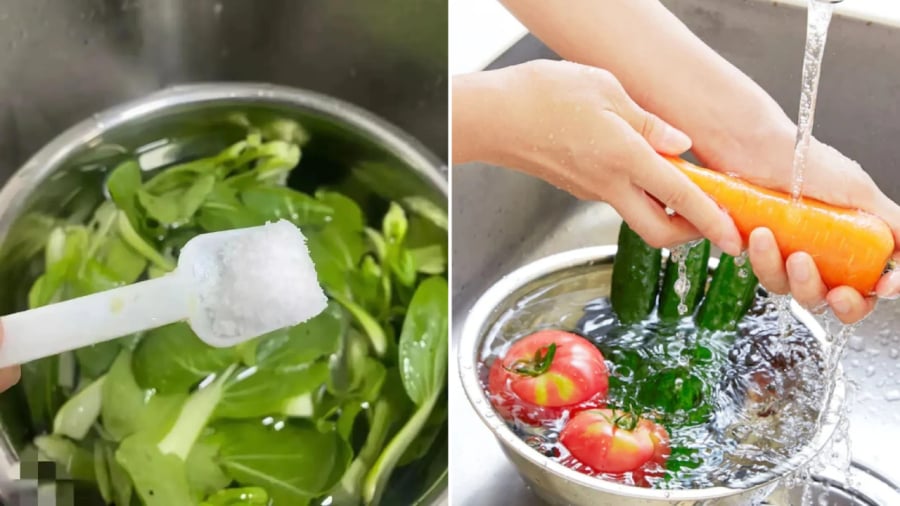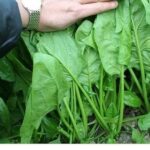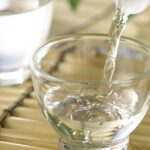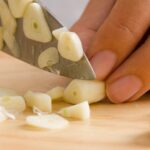Soaking vegetables in a saltwater solution before consumption is a common practice for many. Salt is considered a natural disinfectant, effective in killing certain harmful bacteria and germs found on produce. It is also inexpensive and readily available as a daily cooking ingredient, making it a popular choice for households.
However, the belief that soaking produce in saltwater can effectively remove pesticide residues is a misconception.
Soaking Vegetables in Saltwater Does Not Remove Pesticide Residues
According to Hà Nội Mới, Dr. Nguyễn Huy Hoàng from the Vietnam-Russia Oxy Center (Ministry of Defense) shared that many individuals soak their fruits and vegetables in saltwater for 15-20 minutes, believing it will eliminate pesticide residues and parasites. However, there is currently no conclusive evidence to support the idea that rinsing produce with saltwater effectively removes these harmful substances. On the contrary, prolonged soaking can cause the vegetables to break down, resulting in a loss of vitamins and minerals. Additionally, salt can be absorbed back into the produce, unintentionally increasing salt intake, which can lead to high blood pressure and cardiovascular issues.

As reported by VnExpress, Agricultural Chemistry Professor Yan Ruihong from National Taiwan University stated that most pesticides are fat-soluble. Therefore, soaking produce in saltwater is ineffective in removing these chemicals.
Aside from salt, some people use baking soda to wash their fruits and vegetables. Baking soda has a mild alkaline property, and in theory, it can break down acidic pesticides. However, even with a pH level of 9, it would take up to 12 hours for the chemicals to completely degrade. Produce is not soaked for such an extended period, and prolonged soaking can also affect the freshness and quality of the food. Therefore, using baking soda is not a reliable method for removing harmful substances.
Another popular method for washing produce involves the use of vinegar. While vinegar can slow down the breakdown of pesticides, it can also alter the taste of the vegetables and fruits.
There are various types of pesticides available on the market, including neutral, alkaline, and acidic ones. Using baking soda or vinegar does not change the solubility of neutral pesticides. For acidic or alkaline pesticides, adding an alkaline or acidic substance like baking soda or vinegar may reduce their solubility and washability.
The chemical structures of pesticides are diverse, and when different washing methods are applied, they may not disappear but rather transform into other substances, which may not be entirely safe for consumption.
Furthermore, we often do not know what specific pesticides have been used on the produce we purchase. Therefore, using salt, baking soda, or vinegar may not effectively remove all traces of these chemicals.
The Most Effective Way to Wash Produce
Currently, the most effective and recommended method for washing fruits and vegetables is rinsing them thoroughly under running water, as suggested by numerous experts and studies.
If the pesticides are on the surface of the produce, multiple rinses with clean water, gentle scrubbing, or peeling can help remove these harmful substances. In cases where the pesticides have penetrated the produce, in addition to thorough rinsing, blanching, and cooking at high temperatures can help break down the chemicals. This is because some pesticides are water-soluble at high temperatures or can vaporize when exposed to heat.
For leafy vegetables, separate the leaves and rinse them individually under running water to ensure the removal of any surface contaminants. For vegetables with layered leaves like cabbage, separate the layers and rinse each one thoroughly.
When washing fruits, you can use a clean cloth or a soft-bristled brush to gently scrub the exterior.
For fruits like grapes, it is advisable to detach each grape from the bunch before rinsing.






































